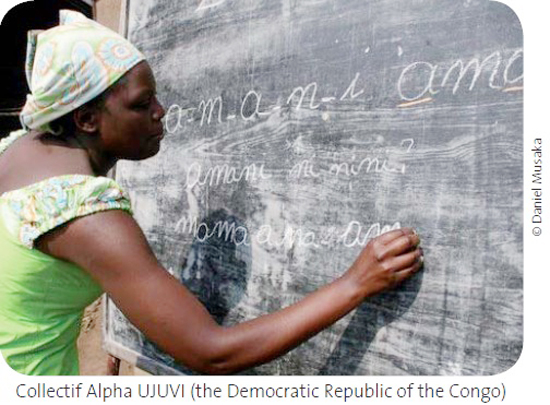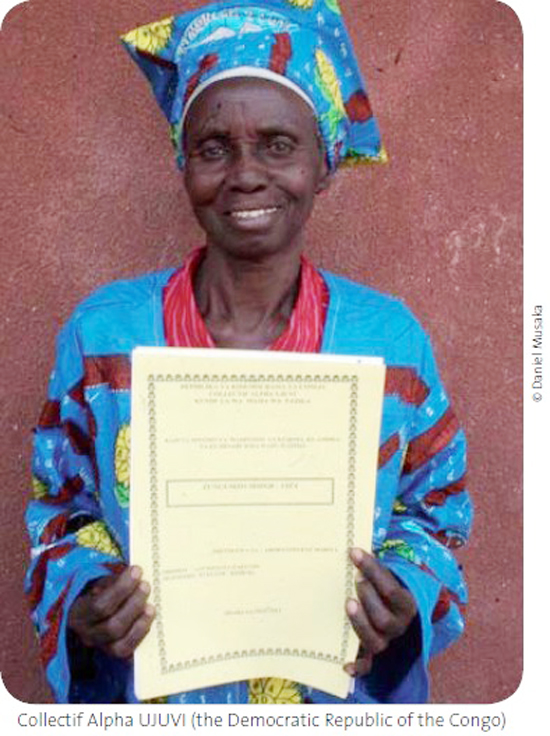刚果民主共和国:和平茅草屋
2011-12-13 14:03:00 来源: 大众网 我要评论
[提要] 该奖授予Collectif Alpha UJUVI的“扫盲促进社会和平共存和良好治理项目”。该项目于2010年在北部奇夫开始实施。该省长期以来饱受政治动荡之苦,人口大批流亡,导致了长期的不安全和缺乏和平。
刚果民主共和国
和平茅草屋和扫盲为政治动荡的北部奇夫带来安全





和平茅草屋旨在消除冲突,也是刚果民主共和国所开展的扫盲计划的一个组成部分。该计划赢得了联合国教科文组织的孔子教育奖
该奖授予Collectif Alpha UJUVI的“扫盲促进社会和平共存和良好治理项目”。该项目于2010年在北部奇夫开始实施。该省长期以来饱受政治动荡之苦,人口大批流亡,导致了长期的不安全和缺乏和平。
在Deodata Bunzigiye修女的指导下,这一创新计划通过扫盲防范和消除该地区个人和社区之间的紧张局势和冲突。
项目旨在培训教师的扫盲技能,提高社区扫盲意识,并在各个扫盲中心间建立协调机制,监督并评估其工作。
2006年,扫盲工作人员通过学习者对话了解到大多数个人和社区均存在冲突,该计划确定了新的方向。
Collectif Alpha Ujuv1决定直接面对这一问题,并在针对新脱盲者开展的工作中纳入问题的解决方法。
该机构开展了一项冲突的预防、调解、管理和良好治理的培训,还制定了一项纳入上述元素的计划。该培训也被纳入了北部奇夫地区的和平教育。
新脱盲者选择传统的问题解决方式和讨论方式,和平茅草屋发挥了中立和促进友好的规划的作用。该计划还旨在鼓励妇女参与社区核心决策并提高妇女地位。
学习者的任务是促进社区领袖、公众以及政府间的交流、规划和合作。每天消除两个冲突一年就可以解决576个冲突。该计划自启动以来,已有10980人参与了和平茅草屋的活动,该活动同时也举办以斯瓦西里语和法语教学的针对成人和青年的扫盲课程。
课程学习强化了和平茅草屋的这一模式,纳入了和平、良好治理、冲突、暴力、共同生活、腐败、部落主义、权利、财富、决策、领导能力和仇恨。Louise Cheftaine讲述了她学到的新能力帮助她为自己的社区带来和平。“由于没有文化,我深受其苦。在我们的社会里,教育妇女被认为是浪费时间,因为她们最后就是做家务。我的父母也认同这一种落后的想法,因此家里人不认为我是家里的后裔,我被剥夺了继承的权利。在我们那儿非常不安全,对此我无能为力。自从我参加了扫盲计划,我感觉我获得了自由。我参与解决社区问题,通过与社区领袖合作和讨论,我已经促进了不安全因素的消除。”
学习者Mapendon Furaha说:“因为我必须照顾我的兄弟姐妹、侄子和侄女,因此我从来没有机会学习。我一辈子都感觉到没人听我的。甚至我的丈夫也把我当成一个傻瓜,因为我没有受过教育。在参加了扫盲课程之后,我能读能写能算了。让我非常高兴的是,我的家人现在对我很尊重。我已经是Baraza(和平茅草屋)的顾问,每个人都听我的意见来做决定。”本计划得到了联合国教科文组织、联合国人口基金会和行动援助等国际组织的支持。
www.alphaujuvi.net
Mary de Soesa
Nepal Reading time in the Library
Peace huts and literacy bring security to politically unstable communities in North Kivu
DEMOCRATIC REPUBLIC OF THE CONGO
The Collectif Alpha UJUVI in the Democratic Republic of the Congo, has been awarded the 2011 UNESCO Confucius Prize for Literacy for its programme on Literacy for the peaceful coexistence of communities and good governance in North Kivu Peace Huts used for conflict resolution form part of a literacy programme in the Democratic Republic of the Congo which has won one of the two awards of the UNESCO Confucius Prize for Literacy.
The award was given to the Collectif Alpha UJUVI for its programme “Literacy for the peaceful coexistence of communities and good governance” which started in North Kivu in 2010. The province has suffered long-term political instability and massive displacement of populations leading to permanent insecurity and lack of peace.
Under the direction of Sister Deodata Bunzigiye the innovative programme uses literacy to prevent and resolve tensions and conflicts among individuals and communities in the region.
Its objectives are to train trainers in literacy techniques, sensitize communities about illiteracy, build coordination among literacy centres and supervise and evaluate their work.
The programme took a new direction in 2006 when literacy workers realized through dialogue with learners that there were conflicts between individuals and between communities in the majority of literacy circles.
The Collectif Alpha UJUVI decided to confront the problem and incorporate the solution into work with the newly literate. A training on prevention, mediation, and management of conflict and good governance and a programme incorporating these elements was created. The training was incorporated into the promotion of peace education in North Kivu.
Newly-literate learners opted for a traditional Kivu method of problem resolution and discussion, the Peace Hut, which would act as a neutral and friendly dialogue space. The programme also aimed specifically to integrate women into the decision-making process at the heart of the community and improve their status.
The task of the learners was to promote exchanges and dialogue and cooperation between community leaders, the population and authorities taking into account different local characteristics of North Kivu’s six territories. Each week two cases of conflict are dealt with, equalling 576 cases resolved each year. Since its launch 10,980 people have taken part in the Peace Hut scheme which runs alongside literacy classes for adults and young people in both Swahili and French.
Subjects in the classroom reinforce the Peace Hut formula and include peace, good governance, conflict, violence, cohabitation, corruption, tribalism, power, riches, decision-making, being a leader and hatred.
Louise Cheftaine described how her new abilities had helped to bring peace to her neighbourhood. “I suffered a great deal because of my illiteracy. In this society it is considered a waste of time to educate a woman because she will just end up doing the housework. My parents believed in this non-progressive philosophy and as a result I was not considered an heir and deprived of my inheritance.
Also in my neighbourhood there was huge insecurity and I could do nothing about it. Since I followed the literacy programme I feel free. I am involved in trying to resolve problems in my community and thanks to collaboration and discussion with local leaders I have been instrumental in removing the insecurity.”
Learner Mapendon Furaha said: “I never had the chance to study because I was obliged to look after my brothers and sisters and later my nephews and nieces. All my life I had the impression that no one listened to me.
Even my husband treated my like a simpleton because I hadn’t studied. After following the literacy course I am able to read, write and calculate. To my profound joy my family now treat me with some esteem and consideration.
I have become a member of Baraza (Peace Hut) as a counsellor and everyone counts on my opinion to take decisions.”
The programme is supported by UNESCO, UNFPA and Action Aid among others.
www.alphaujuvi.net
Mary de Sousa

> 进入微博< 热点图片
大众网版权与免责声明
1、大众网所有内容的版权均属于作者或页面内声明的版权人。未经大众网的书面许可,任何其他个人或组织均不得以任何形式将大众网的各项资源转载、复制、编辑或发布使用于其他任何场合;不得把其中任何形式的资讯散发给其他方,不可把这些信息在其他的服务器或文档中作镜像复制或保存;不得修改或再使用大众网的任何资源。若有意转载本站信息资料,必需取得大众网书面授权。
2、已经本网授权使用作品的,应在授权范围内使用,并注明“来源:大众网”。违反上述声明者,本网将追究其相关法律责任。
3、凡本网注明“来源:XXX(非大众网)”的作品,均转载自其它媒体,转载目的在于传递更多信息,并不代表本网赞同其观点和对其真实性负责。本网转载其他媒体之稿件,意在为公众提供免费服务。如稿件版权单位或个人不想在本网发布,可与本网联系,本网视情况可立即将其撤除。
4、如因作品内容、版权和其它问题需要同本网联系的,请30日内进行。




